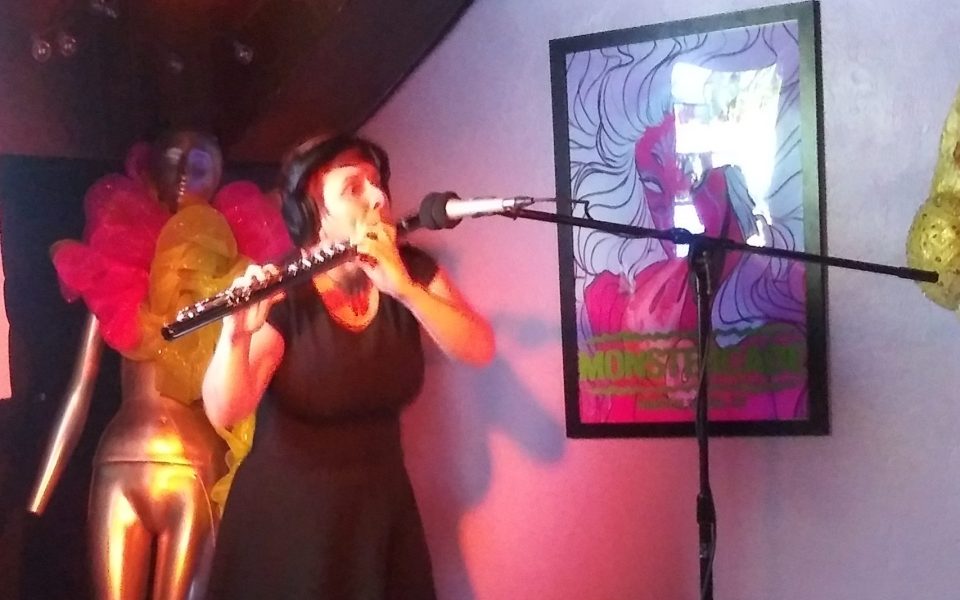Before Rozalind McPhail took the stage, already arranged with her flutes, headphones and effects board, and an overhead projector aimed at an improvised screen made from a shower curtain, the sound tech at Monstercade bearhugged a gold mannequin and attempted to lift it off the set. McPhail gestured for him to leave it.
The flute-loopist from the Canadian province of Newfoundland has been creating sounds for the imagery at hand — mostly short films, but sometimes photos and, often, the things she sees around her — since she graduated art school, and began wondering how she could change the world with her flute, which like all wind instruments can only play one note at a time.
Technology, and the skill to use it, provided an answer. For her live set, she loops flute lines set to drum and synth tracks, building layer upon layer with a midi foot controller and a voice synthesizer she applies to the flute.
“I consider the electronics my duet partner,” she said.
The effect is somewhat electronic and generally ethereal, but as she demonstrates during her short set at Monstercade, it can be effectively applied to all sorts of imagery.
During her three-month residency for Wilmington’s Cucalorus Film Festival in 2014 that she called “a tribal experience,” she created “From the River to the Ocean,” an audio-visual project about the port city that won her an East Coast Music Award in 2017 — eastern Canada’s version of the Grammys — and fueled interest in her short North Carolina tour, with shows in Asheville, Greensboro, Wilmington and here in Winston-Salem.
Her North Carolina material plays heavily into the set: “Greenfield,” about Wilmington’s Greenfield Park; “Film Equals Jobs,” a mini-doc about local film-industry protests against the state General Assembly’s move to strike film incentives from the state budget; “Now Accepting Food Stamps,” a piece she shot herself about income inequality in Wilmington, the likes of which she had not experienced in Canada, inspired by a large sign above a store.
“You see poverty in Canada, but not so blatant,” she said. “[That sign] was so humungous. It really struck me that there’s something wrong with the world. I saw little reminders of it every day.
“I wanted the music to be my form of acceptance,” she continued. “There are just some things we can’t change in the world.”
The music can elevate the tensions and catalyze release along with the images on the screen, embellish moments of beauty and sorrow, dramatize the narrative in a way that dialogue never could.
“Yukon” is set to slides of the 735-mile Dempster Highway that runs through the region: stills of water, naked mountaintops, frosty tundra, wildlife. “Floe” uses time-lapse footage of the phenomenon taken from the Belcher Islands. As the Northern Lights electrify the sky, we see the ice floe in for foreground break up and float off. “Victoria Street” takes place in her own neighborhood on St. Johns Island, on a day when McPhail and her then-boyfriend decided to knock on everyone’s doors and introduce themselves to their neighbors.
[pullquote]For more about the artist and other tour dates see rozalindmacphail.com.[/pullquote]
“It just shows how impermanent life can be,” she said. “None of the relationships in this film exist anymore. We’ve got to document our lives, capture our memories. They never happen again.”
She closes the Monstercade set with “The Gaze,” featuring musical lines created with an omnichord flute, laid over a supercut of old civic documentary films from the 1940s, salvaged from the Wilmington Library, the scenes chosen for the moment when the subject looks directly at the camera.
Some glance surreptitiously while others beam smiles at the lens in time-capsule clothing and hairstyles, old automobiles cruising the streets. It’s both film and music, art and documentary.
Like the music behind it, the piece manages to hit several notes at once.
Join the First Amendment Society, a membership that goes directly to funding TCB‘s newsroom.
We believe that reporting can save the world.
The TCB First Amendment Society recognizes the vital role of a free, unfettered press with a bundling of local experiences designed to build community, and unique engagements with our newsroom that will help you understand, and shape, local journalism’s critical role in uplifting the people in our cities.
All revenue goes directly into the newsroom as reporters’ salaries and freelance commissions.


Leave a Reply